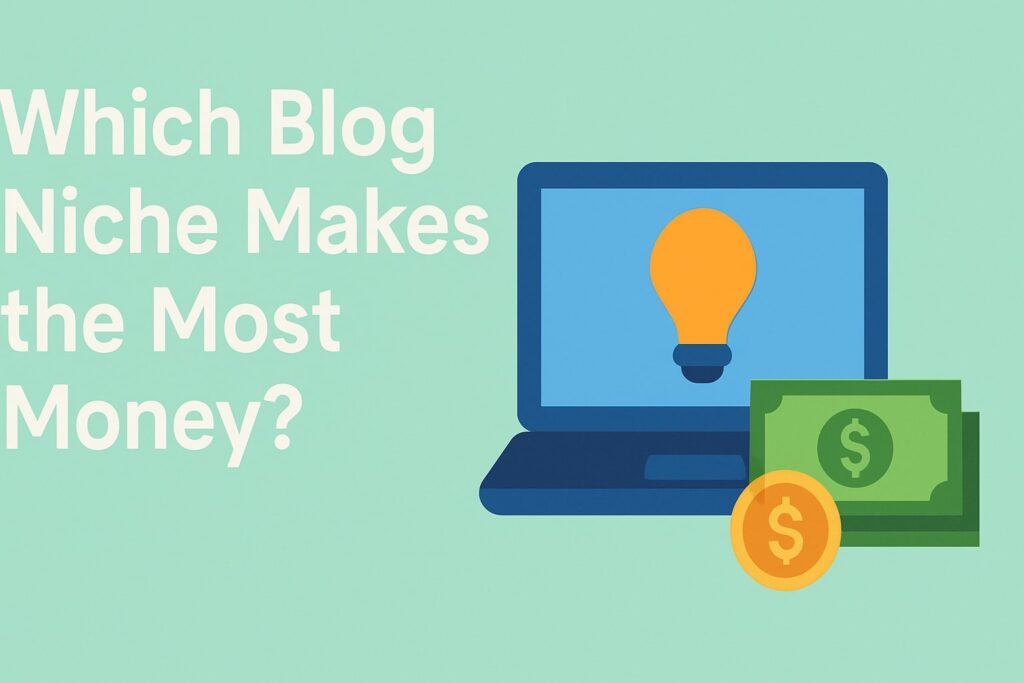In today’s digital landscape, blogging has evolved from a hobby into a legitimate career path for many individuals. Whether you’re passionate about cooking, finance, technology, or travel, there’s a niche out there that can potentially turn your interests into a profitable business. However, not all niches are created equal when it comes to earning potential. Some niches naturally attract more advertisers, affiliate programs, and high-paying sponsorships, making them far more lucrative than others. In this article, we’ll dive into the most profitable blogging niches and explore why they generate significant income, along with tips on how you can capitalize on these opportunities.
Table of Contents

1. Personal Finance & Money Management
Why It’s Lucrative:
The personal finance niche is widely regarded as one of the most profitable blogging categories. People are constantly seeking advice on how to manage their finances, invest wisely, save for retirement, pay off debt, and grow their wealth. This niche appeals to a broad audience, ranging from young adults just starting their careers to retirees planning their financial futures. With so many people eager to improve their financial literacy, bloggers in this space have a massive opportunity to monetize their expertise.
- Monetization Opportunities:
- Affiliate Marketing: Promote financial tools like budgeting apps, credit cards, investment platforms (e.g., Robinhood, Acorns), or tax preparation software.
- Sponsored Content: Partner with banks, insurance companies, fintech startups, or financial advisory firms.
- Digital Products: Create eBooks, online courses, spreadsheets, or templates that help readers achieve specific financial goals.
Top Players in the Space:
Blogs like The Simple Dollar and Mr. Money Mustache have built multi-million-dollar empires by offering actionable advice and monetizing through affiliate marketing, ad revenue, and product sales. These blogs often earn six or seven figures annually, thanks to their ability to connect with a highly engaged audience.
2. Health, Fitness & Wellness
Why It’s Lucrative:
The health and fitness industry is booming, with people increasingly prioritizing their physical and mental well-being. From weight loss strategies and workout routines to nutrition advice and mindfulness practices, this niche caters to a wide range of interests. The global fitness market was valued at over $100 billion in 2022, and bloggers can tap into this demand by providing valuable content that helps readers achieve their goals.
- Monetization Opportunities:
- Affiliate Marketing: Promote fitness equipment, supplements, meal delivery services, or wearable tech like Fitbit or Apple Watch.
- Sponsored Content: Collaborate with gyms, fitness brands, wellness companies, or even yoga studios.
- Product Sales: Offer personalized fitness plans, workout guides, meal plans, or online coaching services.
Top Players in the Space:
Fitness influencers like Kayla Itsines and Joe Wicks (The Body Coach) have turned their blogs into multi-million-dollar businesses by creating workout programs, meal plans, and fitness challenges. Their success demonstrates the immense earning potential of this niche.
3. Technology & Gadgets
Why It’s Lucrative:
Tech enthusiasts are always on the lookout for the latest gadgets, software updates, and tech news. With rapid advancements in technology, this niche offers endless opportunities for content creation. Tech blogs appeal to a highly engaged audience that’s willing to spend money on cutting-edge products, making it a lucrative space for bloggers.
- Monetization Opportunities:
- Affiliate Marketing: Promote electronics like smartphones, laptops, smart home devices, or gaming consoles.
- Sponsored Reviews: Partner with tech companies to review their products or write detailed tutorials.
- Display Ads: Earn passive income through ad placements from tech-related websites and brands.
Top Players in the Space:
Blogs like Gizmodo and The Verge generate significant revenue through ad placements, sponsored content, and affiliate links. Even smaller tech blogs can earn substantial income by reviewing products and recommending tools to their audience.
4. Travel & Adventure
Why It’s Lucrative:
The travel niche is another highly profitable category, especially as people become more interested in exploring new destinations post-pandemic. Travel bloggers share tips on everything from budget-friendly trips to luxury vacations, making this niche appealing to a wide range of readers. With millions of people searching for travel inspiration daily, bloggers in this space have a vast audience to tap into.
- Monetization Opportunities:
- Affiliate Marketing: Promote travel gear, booking platforms (e.g., Expedia, Booking.com), luggage brands, or travel insurance providers.
- Sponsored Trips: Collaborate with tourism boards, hotels, airlines, or travel agencies to create promotional content.
- Product Sales: Sell travel guides, itineraries, photography presets, or online courses about travel planning.
Top Players in the Space:
Blogs like Nomadic Matt and The Blonde Abroad have turned their passion for travel into full-time careers. They earn money through affiliate marketing, brand partnerships, and selling digital products like travel guides.

5. Food & Recipes
Why It’s Lucrative:
Food blogging is one of the most popular and competitive niches, but it’s also one of the most lucrative. With millions of people searching for recipes, cooking tips, and restaurant recommendations every day, food bloggers have a vast audience to engage with. Additionally, food is a universal topic that transcends demographics, making it accessible to a wide range of readers.
- Monetization Opportunities:
- Affiliate Marketing: Promote kitchen appliances, cookbooks, meal kits, or specialty ingredients.
- Sponsored Content: Partner with food brands, restaurants, grocery stores, or meal delivery services.
- Product Sales: Sell cookbooks, meal plans, or online cooking classes.
Top Players in the Space:
Food bloggers like Pinch of Yum and Damn Delicious have built successful businesses by sharing delicious recipes and monetizing their traffic through ads, affiliate links, and product sales. Their success highlights the earning potential of this niche.
6. Lifestyle & Self-Improvement
Why It’s Lucrative:
The lifestyle niche is incredibly versatile, covering topics like productivity, mindfulness, relationships, and personal growth. This flexibility allows bloggers to cater to a wide audience while still maintaining a focused brand. As more people seek ways to improve their lives, this niche continues to grow in popularity.
- Monetization Opportunities:
- Affiliate Marketing: Promote self-help books, planners, wellness products, or productivity tools.
- Sponsored Content: Collaborate with lifestyle brands, wellness companies, or subscription box services.
- Product Sales: Sell online courses, eBooks, membership communities, or printable resources.
Top Players in the Space:
Blogs like Zen Habits and Tiny Buddha have carved out a niche in the self-improvement space, generating income through affiliate marketing, ad revenue, and digital products. Their success shows that focusing on personal development can be both fulfilling and profitable.
7. Parenting & Family
Why It’s Lucrative:
Parenting blogs cater to a highly engaged audience of parents who are looking for advice on raising children, managing family life, and finding the best products for their kids. This niche is particularly lucrative because parents are willing to spend money on products and services that make their lives easier or enhance their children’s well-being.
- Monetization Opportunities:
- Affiliate Marketing: Promote baby products, toys, educational materials, or parenting tools.
- Sponsored Content: Partner with parenting brands, family-oriented companies, or childcare services.
- Product Sales: Sell parenting guides, eCourses, printables, or membership programs.
Top Players in the Space:
Blogs like Scary Mommy and Mommy Shorts have built large followings by offering relatable content for parents. They monetize their blogs through ads, affiliate links, and partnerships with family-focused brands. Their success underscores the profitability of this niche.
How to Choose the Right Niche for You
While the niches listed above tend to be the most lucrative, the key to building a profitable blog lies in finding a niche that aligns with your passions and expertise. A blog that resonates with your audience and provides real value will always have the potential to generate income, regardless of the niche. Here are some tips to help you choose the right niche:
- Follow Your Passion: Choose a topic you’re genuinely passionate about. This will keep you motivated during challenging times and help you create authentic content.
- Assess Market Demand: Use tools like Google Trends, keyword research, and social media to gauge interest in your chosen niche.
- Evaluate Monetization Potential: Research whether your niche has ample opportunities for affiliate marketing, sponsorships, and product sales.
- Identify Your Unique Angle: Differentiate yourself by offering a fresh perspective or targeting a specific sub-niche within a broader category.
Final Thoughts: Building a Profitable Blog
While personal finance, health & fitness, technology, travel, food, lifestyle, and parenting are among the most profitable niches due to their broad appeal and high demand, success ultimately depends on your ability to provide value and build a loyal audience. By leveraging affiliate marketing, sponsored content, and digital products, bloggers in these niches can create sustainable, income-generating businesses.
Remember, consistency, quality content, and strategic monetization are the keys to long-term success. So, whether you’re passionate about helping people save money, inspiring them to live healthier lives, or sharing your love for travel, there’s a lucrative niche waiting for you to conquer. Start small, stay focused, and watch your blog grow into a thriving business.


Interesting perspective on finding a profitable blog niche! I agree that aligning your blog with your passions and expertise is crucial, but how do you balance that with market demand? Sometimes what we love might not have a large audience. I also wonder if starting small and staying focused is enough in such a competitive space. What about the role of social media and SEO in driving traffic? Do you think it’s possible to succeed without investing in these areas? Lastly, how do you measure the “real value” you’re providing to your audience? Would love to hear your thoughts!
Thank you so much for sharing your thoughts! You’ve raised some really important points that every blogger—especially beginners like me—needs to consider.
You’re absolutely right; balancing passion with market demand can be tricky. I believe the sweet spot lies in finding a niche where our interests overlap with what people are actively searching for. That’s where tools like keyword research and audience feedback really help guide the way.
Starting small and staying focused has personally helped me avoid burnout and stay consistent. But as you said, the blogging space is super competitive, so I’m learning to slowly scale up with strategy.
Regarding social media and SEO, I think they’re almost non-negotiable today. Organic traffic is still gold, and SEO is a long game—but a powerful one. Social media helps us build that personal connection and community, which is priceless.
Measuring “real value” is something I’m still figuring out. Right now, I look at engagement—comments, shares, return visits—and feedback. If readers are taking the time to respond or apply what I share, I feel that’s a strong indicator.
Thanks again for your amazing input! Would love to hear more about your experience balancing all this—still so much to learn!